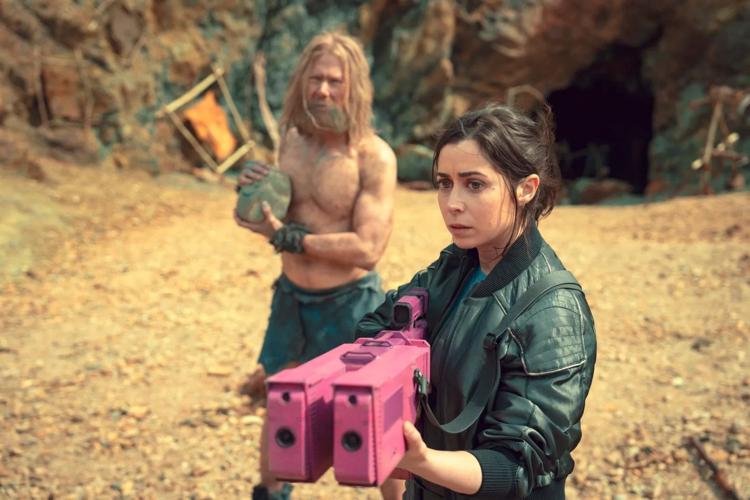This series is about technology and how technology can and is affecting human beings. The "black mirror" is a reference to a person's cell phone or mobile device when it's turned off. What was strange about Season 6 is that writer Charlie Brooker tried something different. There were several episodes in Season 6 that didn't really have anything to do with technology. There were more fantastical episodes, dealing with demons and werewolves. It didn't feel like what the series had always been. It almost felt like Brooker had run out of ideas for this series. This season returns the show back to its technological roots. However, several episodes aren't about new technology but rather technology ideas that Brooker has used in previous seasons and he utilizes these used ideas not once but multiple times. Half the episodes here are about this piece of technology that Brooker designed in previous seasons, which is a device the size and shape of a nickel that is placed on the right side of a person's head near their eye. This tech takes people into a virtual reality that incapacitates their bodies and fully immerses their minds in that virtual reality, which looks and feels very real.
This kind of tech Brooker really used to great effect in Season 3. He won the Emmy Award for Outstanding Television Movie with the episode "San Junipero," which really weaved a heartwarming and heartbreaking story. Brooker won that same Emmy again in Season 4 for the episode "USS Callister" and Jesse Plemons was nominated at those Emmys for Outstanding Lead Actor in a Limited Series or Movie. That episode was highly regarded and became one of the best episodes that Brooker has ever produced. Another highly regarded episode was in Season 5 with "Striking Vipers," which also utilized that same VR technology portrayed in those aforementioned stories. It makes sense that Brooker would return to those episodes and return to that technology that has brought him the most success and acclaim. It could be considered lazy or him simply giving the people what they want. As such, he's crafted what could be called a spiritual sequel to "San Junipero" and what is a literal sequel to "USS Callister."

That spiritual sequel is Episode 3, titled "Hotel Reverie." At its core, it's about two women in a virtual reality where they come to fall in love with each other. It's a lesbian VR fantasy, which is basically what "San Junipero" was. In this case, the two women are played by Emmy nominee, Issa Rae (Insecure and A Black Lady Sketch Show) and fellow Emmy nominee, Emma Corrin (The Crown and Deadpool & Wolverine). The plot isn't all that important, except that it does what actors like Issa Rae always complain that Hollywood never let them do. She gets to be the lead in a romantic drama. Obviously, Rae got to do that in her own show, but she had to create that herself. This episode is saying that her only opportunity to do so now is through an independent and experimental production that's outside of Hollywood. However, at the same time, it does do what Hollywood has started doing recently and that's crafting remakes with gender-swapped or race-swapped leads. There's been somewhat of a backlash of those kinds of Hollywood remakes, but Brooker seems to be making his position on the topic known.
In Season 6, Brooker was nominated for an Emmy for the episode "Joan Is Awful," which was in many ways a critique and drubbing of the very company that is paying Brooker. "Joan Is Awful" is on its surface a satire of Netflix. He essentially bites the hand that feeds him. It could be argued that "Joan Is Awful" is bigger critique of certain A.I. companies or others using people's likeness for whatever media they want with or without people's consent to do so. One could argue that Brooker's aim wasn't Netflix necessarily but this greater issue of A.I. and copyright of people's likeness in film and television. In Season 7 here, Brooker could arguably be taking aim at streaming services, not necessarily Netflix, as well as cell phone providers or Internet Service Providers aka ISPs with his episode "Common People." Like other Brooker episodes, the premise seems so preposterous, which makes it a clear satire or just sheer metaphor that suspension of disbelief becomes increasingly difficult, but it makes for a great acting vehicle. Such is the case with Episode 5, which features Oscar nominee, Paul Giamatti (The Holdovers and Sideways). The episode is really just an acting vehicle for Giamatti who delivers as he always does.

The best episode here is the aforementioned sequel to "USS Callister" called "USS Callister: Into Infinity." Brooker manages to craft a very strong follow-up that still incorporates Jesse Plemons who was the villainous character who was dispatched in the previous installment. This sequel still focuses on Cristin Milioti (The Penguin and How I Met Your Mother) who stars as Nanette Cole, a programmer at a VR game company called Infinity. She has a digital clone made of her without her consent. That digital clone is trapped and tortured inside the game and is trying to escape. The digital clone needs the help of her real-life self in order to do so. The digital clone thought she escaped at the end of the previous episode, but this episode shows that her escape isn't over or she didn't escape the game but simply moved into another part of it. The digital clone still needs help from Nanette, but one of the standouts is Jimmi Simpson (Westworld and House of Cards) who plays James Walton, the corrupt and idiotic CEO who runs the company that owns the Infinity game. He's so silly and yet also so sinister in this episode. If anyone should get an Emmy nomination for this episode, it should be Simpson.
Rated TV-MA.
Running Time: 1 hr. / 6 eps.
Available on Netflix.











